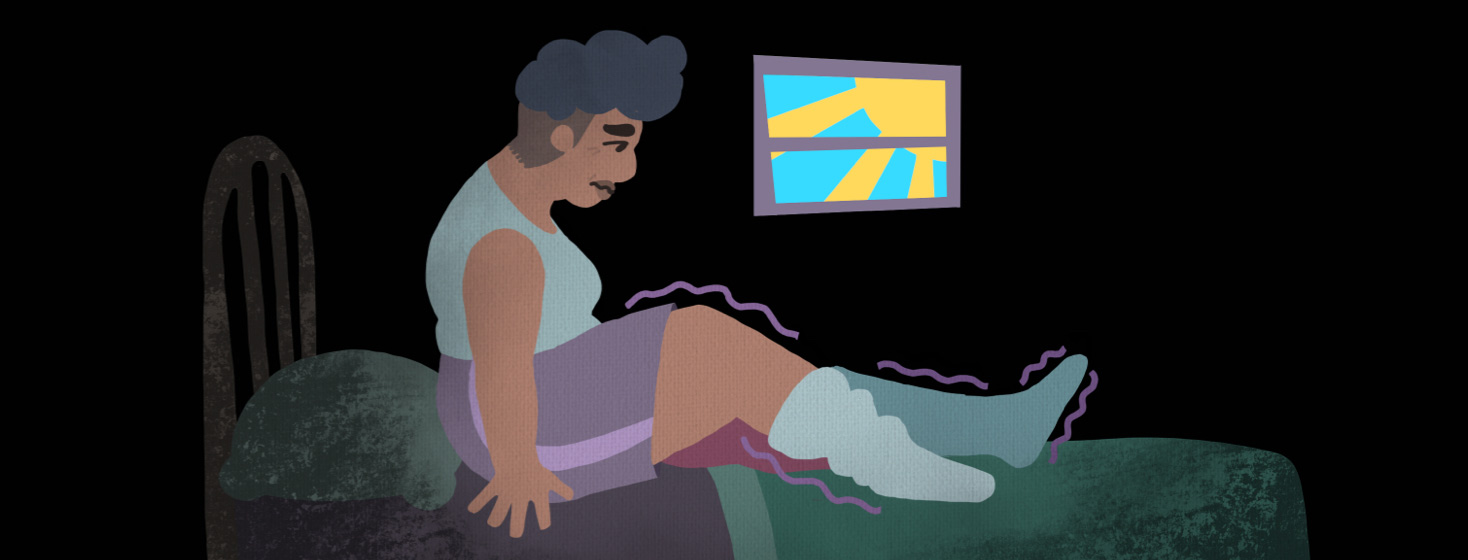Is There a Link Between Vitamin D and Restless Legs Syndrome?
Restless legs syndrome (RLS) is a neurological and sleep disorder that affects up to 10 percent of the population. It causes unpleasant or painful sensations in the legs at rest or while trying to fall asleep. These sensations temporarily stop with movement but return again at rest.1
Those living with RLS describe their symptoms as mild tickling, crawling, or aching sensations. RLS can make it difficult to sleep. This loss of sleep over many nights can significantly reduce quality of life for those living with RLS.2
Usually, RLS is a primary disorder. The symptoms occur on their own and the cause is not well known. RLS can also be secondary. Secondary disorders are caused by or related to another disorder. RLS is often seen in people living with iron deficiency, renal failure, diabetes, or pregnancy.3
RLS and dopamine
RLS is thought to be caused by issues in the brain’s dopamine pathways. Dopamine is a neurotransmitter, or a molecule that the brain uses to send messages. It specializes in messages about motor control and muscle movement.
Movement disorders like Parkinson’s can result when dopamine is not sent to other cells as often as it should. Researchers now are studying dopamine and how it relates to RLS.3
The role of neurotransmitters
There are many different neurotransmitters in the body. They send different signals according to what cells they talk to and what other signals are sent to those same cells. Sometimes, opposite messages are sent to the same brain area at the same time. The signals balance each other to produce the correct action or thought.
Dopamine sends important 'off' signals
The ‘motor cortex’ is an area of the brain that controls movement. It receives many signals from all over the body. In this area, dopamine acts as an ‘off’ signal. It can relax the muscles in the legs. If there is not enough dopamine or if it is not released at the right time, it cannot give the ‘off’ message. This results in more ‘on’ signal than usual. Researchers believe that this causes the unpleasant sensations of RLS.1
Vitamin D and dopamine signaling
The most common source of vitamin D is from sunlight. It is also often taken as a supplement. Vitamin D is most known for its role with calcium to keep bones strong. New research has shown that vitamin D is involved in dopamine signaling as well. Vitamin D deficiency is now thought to be involved in disorders like multiple sclerosis, parkinsonism and RLS.1,3,4
Research has revealed that vitamin D works in the brain to regulate the development and function of certain neurons, or brain cells. Vitamin D is very important for dopaminergic neurons in particular. It can increase the amount of dopamine created in the motor cortex and it can protect neurons from toxins.3
Vitamin D and RLS treatment
A 2012 study found that decreased vitamin D levels correlated with increased RLS severity. This encouraged further studies to see if increasing vitamin D could reduce RLS symptoms. In 2014, researchers performed a small study to test this theory. They found that vitamin D supplements significantly improved RLS symptoms. It supported previous studies linking vitamin D, RLS, and dopamine.1
In 2018, the same researchers performed a similar study but found very different results. They did not see improvement in RLS symptoms. It indicated that vitamin D supplements may not be effective for RLS. However, the researchers believe that the results may have been different if the study was longer or if they used higher levels of vitamin D.5
What's next?
The research on vitamin D and RLS is still in its early stages. While there is some promising research connecting the two, we need to learn more before vitamin D can be used as an RLS treatment.
If you are experiencing RLS symptoms or wish to know more about your vitamin D levels, speak to your healthcare provider.
Interested in reading more about alternative treatments for symptom relief? Explore our featured collection on lifestyle changes and alternative treatments for RLS.

Join the conversation